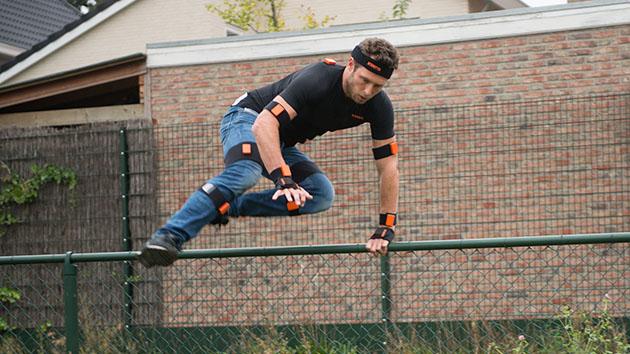Polygraph
Latest

Motion capture suits can detect lies better by tracking your fidgeting
Stone-cold bad guys don't worry about lie detectors, because they can only suss out fibs 60 percent of the time -- not much better than someone without one. But there's a new hope for cops. Scientists at the University of Cambridge have used full-body motion capture suits to cajole the truth at a much better clip. They put 90 volunteers in $12,000 Xsens mocap suits, and had them lie to other volunteers. By tracking joint displacements, their algorithms could pick three out of four liars -- a much more useful result for law enforcement. One researcher said "put simply, guilty people fidget more... independent of cultural background, cognitive load and anxiety." The team thinks it can fine tune it for even better accuracy, so police may one day be squeezing perps into skin-tight suits rather than finger sensors.

Uber explores using biometrics and lie detectors to screen drivers
Uber has come under fire for allegedly doing little to protect passengers from unscrupulous drivers, and it's determined to improve that reputation -- in some cases, using relatively unusual methods. The ridesharing company's recently hired Head of Global Safety, Philip Cardenas, tells customers that Uber is exploring numerous techniques for verifying drivers, such as biometrics, voice fingerprinting and lie detector tests. "Scientific analysis and technology" should help make up for gaps in background check infrastructure around the world, Cardenas says.

Russian ATM uses voice analysis to tell when you're lying
Credit card applications via automated teller are all the rage abroad these days. That's why Russia's Sberbank is using Speech Technology Center's voice recognition system in its new ATM to tell when you fudge your financials to get approved. Like a polygraph, the technology senses involuntary stress cues to ferret out fib-filled statements -- only instead of using wired sensors, it listens to your angst-ridden voice. Designed using samples from Russian police interrogation recordings where subjects were found to be lying, the system is able to detect the changes in speech patterns when a person isn't telling the truth. Of course, it's not completely accurate, so the biometric voice data is combined with credit history and other info before the ATM can crush an applicant's credit dreams. And to assuage the public's privacy concerns, patrons' voice prints will be kept on chips in their credit cards instead of a bank database. So, we don't have to worry about hackers stealing our biometric info, but we're slightly concerned that we'll no longer be able to deceive our robot overlords should the need arise.

US troops to receive handheld lie detectors
In a move sure to bring the polygraph haters out of the woodwork, the US Army is issuing a handheld lie detector to select soldiers in Afghanistan in order to "root out potential terrorists" and help "narrow the list of suspects after a roadside bombing." The DoD isn't asserting that the device is perfect, but it's hoping the detection capabilities are accurate enough to save American lives and sniff out allegiances that may have otherwise gone unnoticed. Hailed as PCASS (Preliminary Credibility Assessment Screening System), the underlying unit is a TDS Ranger that relies on three sensors connected to a respondent and integrated software that uses Green to signify truth, Yellow if it can't decide and Red if it recognizes a filthy liar on the other end. Nevertheless, we're certain Lafayette Instrument Company is stoked about the deal -- you know, considering that the Army has already purchased 94 of 'em at $7,500 apiece.[Thanks, ladderless]

Cornell researchers developing lie-detection software
While most of the world simply takes what everyone else says at face value, there's always been a dark market for inconspicuous lie-detecting gadgetry for the overly paranoid, but researchers at Cornell University are hoping to take lie-detection to the next level by carefully analyzing emails and SMS messages for fibs. In a three-year effort to "compile a list of indicators of written deception," the team drew from some "40 years of research in linguistics and lies, including recent work in the context of computer media and reviews of Enron emails." By carefully inspecting word choices, verb tenses, and a variety of other textual factors, the software can purportedly use "contextual parameters" to spot lies, and they hope to market the goods to police agencies, upset spouses, and of course, corporate ethics committees.So if you're ever-so-suspicious significant other (or mischievous youngster) has just recently put down the Skype headset in favor of pounding out emails, rest assured, help is on the way.[Via TechDirt, image via Cornell]



